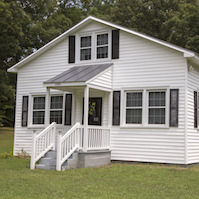 Researchers at Virginia Commonwealth University in Richmond and John Tyler Community College in Chester, Virginia, have conducted an oral history project related to the Rosenwald Schools in Goochland County, Virginia.
Researchers at Virginia Commonwealth University in Richmond and John Tyler Community College in Chester, Virginia, have conducted an oral history project related to the Rosenwald Schools in Goochland County, Virginia.
In the early part of the twentieth-century, approximately 5,000 Rosenwald Schools were built throughout the South, primarily to educate African American children. Julius Rosenwald, who was president of Sear, Roebuck and Company, contributed seed money for the schools but required local Black citizens to contribute to the effort. More than 360 Rosenwald Schools were built in Virginia, including 10 in Goochland County, a rural area northwest of Richmond.
The Goochland County Rosenwald Schools Oral History Project features 19 video interviews with 18 participants who were students at these schools, fully searchable transcripts and tape logs, photographs of the schools and various related documents. The archive is housed at the Virginia Commonwealth University Libraries. The oral history collection can be accessed here.
Brian Daugherity, an assistant professor of history at Virginia Commonwealth University and one of the leaders of the oral history project, stated that “it’s important to understand the Rosenwald Schools because they were a catalyst, along with local activism and pressure, for improving educational opportunities available for African-Americans in the South in the early 20th century. Southern school funding disproportionately benefited the education of white schoolchildren, so Black activism and support for Rosenwald Schools was an important corrective to the injustices and inequities of that time.”


I attend a Rosenwald School in 1969 in Monroeville, Alabama. In 1970, Alabama integrated the school system and the school was renamed Monroeville Middle School.